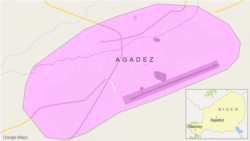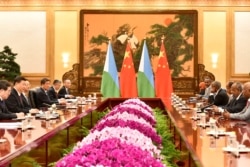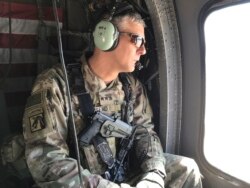The U.S. military says there are fewer than 150 Islamic State fighters left in Libya.
In an exclusive interview Friday with VOA, Africa Command Director of Public Affairs Col. Chris Karns said four U.S. airstrikes this year had killed 43 of the terror groups’ fighters in Libya, where Islamic State forces had been gathering in camps and recruiting new fighters.
“We wanted to make sure that threat did not grow,” Karns said, adding that the U.S. would “continue to monitor the situation” to prevent Libya from gaining a safe haven and taking advantage of a “difficult situation.”
He also said the new Air Force base in Agadez, Niger, was expected to start operations later this year, with U.S. aircraft already landing on the base.
“We’re still waiting for a technical agreement to be signed by the government of Niger. We expect that flying operations will occur this year,” Karns said.
He also spoke about competition with Russia and China on the continent, pointing out that Russia and China are Africa’s top arms exporters.
“That is something that should concern Americans,” he told VOA. “If we do not continue to develop partnerships on the African continent and China and Russia continue on their growth trajectory, they could exercise the influence to deny us access to key areas in the future.”
The interview, edited for brevity, is below:
VOA: We have a president who has expressed an interest to pull out of wars, complains about the presence in Japan, Korea, saying it’s very costly. So make the case for Africa. Why should the military be involved in Africa?
Col. Chris Karns, U.S. Africa Command Director of Public Affairs: So when you look at U.S. Africa Command, the budget that is put forth for the activity we are going about on the continent is 0.3% of the Department of Defense budget. And you saw in the news yesterday, Russia has basically made an emphatic case that Africa is a place that they are going to compete. Similarly, China is an area where they are competing on the African continent. And if you look at the national defense strategy, and the focus on Russia and China, the U.S. involvement on the African continent is not only important for the defense of America from the standpoint of violent extremist organizations, but also it’s important in terms of building the partnerships on the continent and not to allow just China and Russia to gain increased influence. And we saw that Russia plans to compete there, China plans to compete there, and what we’re doing from a U.S. Africa command standpoint, is really something that they cannot bring. So defeating the violent extremist organizations, training the forces — the African partner forces to one day be self-sufficient, where they’re able to counter and defeat these forces on their own, that’s something that we bring to Africa that quite frankly the Chinese and Russians aren’t willing to do to the level and quality that the U.S. military is able to do.
VOA: But Russia is making the case as you said that it wants to be more involved. It’s providing a lot of military arms to African countries. Why are we seeing that military push from Russia right now?
Karns: Well, I think they see the opportunities that are on the African continent. So when you look at the vast just the size and scope of the African continent, it’s 3.5 times the size of the United States. They’re really looking to try to partner, but the way they go about partnership is quite different from the U.S. in terms of our values-based approach to make sure that the African partners are growing, they’re developing. The Russians are not interested in that. They’re simply looking at it from a business standpoint, very transactional. And we look at it from helping our partners, you know, achieve their future without taking it away from them like through mineral extraction and other means that the Russians have employed.
VOA: What are you seeing, and what is U.S. Africa Command seeing on the ground that the Chinese are doing to increase their military presence?
Karns: Well, you can just take Djibouti as an example. They have a military base there, which is within miles of the U.S. presence. When you look at what they’re doing in terms of loans — since 2012, they have granted three times as many loans on the African continent. And really what they’re getting the Africans into is what is called debt-trap diplomacy, where they’re relying on the Chinese in terms of their future.
China has 1.5 million citizens on the African continent. So they are moving in in droves, and they have — similarly to the Russians — they have basically said that this continent is where they want to be seen as a great power. The United States needs to be able to compete and win on the African continent or otherwise China and Russia will move into that space if the U.S. is not there.
VOA: Do you foresee them opening more basis in the coming years?
Karns: Absolutely. So China, when you look at their long-term projections, they would like to open up more ports. Currently, they’re working on 22 ports. They have aspirations to build more bases on the African continent as well. Today they have one. But they take a very strategic, long-range view of Africa and they exercise and are known for strategic patience. The United States isn’t always known for patience. We look at return on investment more, it seems at times, in the near-term. What we’re doing at U.S. Africa Command, we’re seeing the incremental progress, the impact that we’re having with a very small footprint of 6,000-7,000 Department of Defense forces. But 6,000-7000 people (are) taking care of what is required for our nation’s interest, whether it’s defeating violent extremist organizations or building capability. Our core mission really is to build the capability of our African partners through training. A lot of times that gets mixed up through seeing the airstrikes, but really the airstrikes are a very small portion of what our men and women on the continent are doing day in and day out.
It’s really to build partnership capacity. And that actually benefits not only our African partners, but when you see some of the violent extremist organizations on the African continent, we want to make sure that they don’t cross borders and one day shores. Look at some of these groups. They have the intent to strike the United States. They just don’t have the capability today. So the reason they don’t have the capability is because of the applied pressure that is being placed on them. If you take that away, the African partners’ progress that they have achieved, it’s very fragile, and it would possibly go back to where it was. When you take the case of Somalia, the issue of piracy. In 2013, there were 170 instances of piracy. Last year, there were two. This year, two. So a lot of progress is being made in areas but to overcome dated narratives is extremely challenging.
VOA: How soon will this increased interest, this increased military presence on the continent by Russia and China, how soon will that start to affect U.S. military operations and U.S. military interests on the continent?
Karns: So when you look at what Russia, you know, did yesterday with the African-Russian summit, that was a little bit part charm offensive, it was also part Monty Hall, ‘Let’s make a deal.’ They are looking to make as many deals as possible. They are the No. 1 exporter of arms on the African continent. No. 2 is China. That is something that should concern Americans. When we train our African partners, they know they’re getting the ‘gold standard’ of training. If we do not continue to develop partnerships on the African continent and China and Russia continue on their growth trajectory, they could exercise the influence to deny us access to key areas in the future. And that is a concern and it should be a concern, and in this era of global power competition, we don’t want to create an opportunity to make Russia or China great.
VOA: We see that China is interested in Africa with its investments, with its new base. We see that Russia is interested. It just had this recent meeting. It supplies a lot of arms. When we hear about the U.S., we hear the U.S. is reducing its presence on the continent. It’s moving out some forces. Is that the new narrative?
Karns: I don’t think so. So one of the challenges, you know, the United States is a great power. And there’s a lot of priorities across the globe. And I think what the Department of Defense is doing, they’re looking at everything to make sure that our resources, taxpayer dollars are being employed in the very best possible way. The full range of activities we’re involved in, we’re routinely doing exercises. So whether it’s maritime security, or helping our partners disrupt and hopefully dismantle some of the violent extremist organizations. We do exercises to help them with that. We do everything from exercises on rule of law to medical assistance, it’s a full range of activity we offer African partners to make them more stable, secure and prosperous in the future.
VOA: Is it shortsighted to reduce forces?
Karns: So when you look at the situation of resources, what we have today is able to achieve what the nation has asked of U.S. Africa Command. If that changes, if that adjusts, then General (Stephen) Townsend has the ability to go to the secretary of defense, explain what the mission requires, and ultimately, the secretary of defense will decide whether or not we have sufficient resources to conduct the mission that’s been asked of us.
VOA: Going to these hotspots, we’ve noticed that militant Islamist activity has doubled in Africa since 2012. That’s according to the Department of Defense. What is U.S. Africa Command doing to target this and is there a way to bring these violent incidents and these violent extremist activities down?
Karns: So one of the areas right now that is deteriorating from a security standpoint, is the Sahel area. But when you look at that area, I think oftentimes people when they look at the African continent, they see the U.S. as the sole partner. That’s simply not the case. When you look at the Sahel region, it is considered African-led, French-supported and U.S.-assisted. So the expectation for that area is we’re helping with the training, we’re providing some assistance for intelligent sharing , ISR, we’re also providing some assistance with the logistics, but the Sahel area is really the French-supported, African-led area of Africa.
VOA: Do you see the United States being asked to play a bigger role? Right now we have an airbase that’s hopefully going to be up and running soon in Agadez. So do you see the U.S. playing a bigger role?
Karns: So U.S. assistance is always in demand. So if you’d ask any African partner if they would gladly take additional U.S. assistance, I think just about every one of them would say yes. But in the end, when you look at, Will we provide more forces to the Sahel? I think that area is going to require more European assistance as opposed to additional U.S. assistance, but everything’s being looked at.
VOA: Airbase 201 in Agadez. Do you see that coming up and running this year?
Karns: Aircraft, they’re landing there. We’re still waiting for a technical agreement to be signed by the government of Niger. We expect that flying operations will occur this year.
VOA: And do you see that as a big help to the fight against extremists?
Karns: I think so because of the capability that can be provided out of that location.
VOA: Let’s move to Libya. Libya was very quiet militarily for the United States this year, until General Townsend visited. Explain to me the purpose of the airstrikes in Libya. And do you see Islamic State making a comeback there or trying to make a comeback there?
Karns: So since forces, since U.S. forces were relocated in April, we’ve continued to watch and monitor the situation in Libya. Our concern was that with the civil war, these terrorist groups, in particular ISIS (Islamic State), would look to leverage this opportunity to grow, to recruit, to train and create additional chaos in a situation that is already chaotic. So when the opportunity presented itself — and this was through careful observation — there were instances where we saw a regeneration of the ISIS capability. So they were gathering in camps, where they were doing some of the basic training and starting to do some of the recruiting. So we wanted to make sure that threat did not grow. And consequently, airstrikes were conducted. Four this year. Right now, when you look at the numbers, it’s under 150. So 43 Islamic State fighters have been taken out of Libya permanently. And we will look to continue to monitor the situation, and we just do not want Libya to become a laboratory for ISIS to feel that they have safe haven and take advantage of a difficult situation.
VOA: When you say under 150. Do you mean under 150 ISIS fighters, you think?
Karns: That’s correct.
VOA: That is the assessment of the U.S. military? There are less than 200 Islamic State fighters in the state in Libya?
Karns: In Libya, that’s correct.
VOA: Interesting. So with the Middle East defeat, territorial defeat of ISIS, there was a major fear that Islamic State would spread to Africa. You’re saying that it really hasn’t spread too far. It’s been contained in Libya. Is that accurate assessment?
Karns: So what we’ve seen — it’s a trickle. So ISIS doesn’t only, you know, exist in Libya, there’s pockets in Somalia, there’s pockets in other places. And you know, when you look at what has happened in Iraq and Syria, their territorial control was taken away from them. So they have shifted an emphasis toward Africa and the affiliates. So the ISIS threat still exists there in pockets across Africa.
VOA: Let’s shift now, in Somalia. That’s where the U.S. has a pretty large presence there. Would the U.S. military say that they’re being successful in Somalia at this point?
Karns: Our role is, our primary role is to develop the Danob, which is their elite fighting force, and to make sure the Somali national army is also in a position where they continue to make success. But oftentimes people will see the airstrikes, which are important because they help the disrupt al-Shabab. They create organizational confusion, they essentially, the airstrikes prevent them from maneuvering. So they set the conditions for development. They set the conditions for governance, and they’re foundational to the progress that’s being made. But the progress is being made by the federal government of Somalia and the Danob and, you know, at one time, when you looked at Somalia, it was about 85 to 90% of the country was almost overrun with al-Shabab. Today, they maintain about 20% of territory.
VOA: General Townsend has been the AFRICOM commander for going on three months now.
Karns: 91 days
VOA: When are we going to see an assessment from him?
Karns: In terms of a timeline, I don’t want to get into the prediction business. So General Townsend has already visited seven different African partner countries. He also plans to continue to visit the continent. He will be returning in November and I suspect he will continue to go back to continent almost every month.








